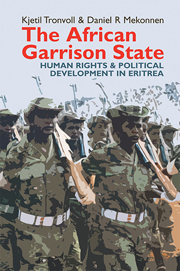Book contents
- Frontmatter
- Contents
- List of Acronyms and Abbreviations
- Preface
- Map 1 Provinces, Main Towns and Ethno-linguistic Groups of Eritrea
- 1 Introduction: The Eritrean Garrison State
- 2 Judicial Development in Independent Eritrea: Legal Pluralism and Political Containment
- 3 Rule of Law(lessness): The Special Court and the Judiciary
- 4 Democratic Curtailment: ‘Never Democracy, Always Control!’
- 5 Obliterating Civil Society: Denying Freedom of Organisation and Expression
- 6 The Eritrean Gulag Archipelago: Prison Conditions, Torture and Extrajudicial Killings
- 7 Everyday Life of Detention and Disappearances: Vulnerable Groups in a Population Under Siege
- 8 Minority Marginalisation: EPLF's Policies of ‘Cultural Superiority’
- 9 Diversity Diminished: Targeting the Kunama Minority Group
- 10 The Militarisation of Eritrean Society: Omnipresent and Never-Ending Military Service
- 11 Eritrea: Towards a Transition?
- Bibliography
- Index
8 - Minority Marginalisation: EPLF's Policies of ‘Cultural Superiority’
Published online by Cambridge University Press: 05 October 2014
- Frontmatter
- Contents
- List of Acronyms and Abbreviations
- Preface
- Map 1 Provinces, Main Towns and Ethno-linguistic Groups of Eritrea
- 1 Introduction: The Eritrean Garrison State
- 2 Judicial Development in Independent Eritrea: Legal Pluralism and Political Containment
- 3 Rule of Law(lessness): The Special Court and the Judiciary
- 4 Democratic Curtailment: ‘Never Democracy, Always Control!’
- 5 Obliterating Civil Society: Denying Freedom of Organisation and Expression
- 6 The Eritrean Gulag Archipelago: Prison Conditions, Torture and Extrajudicial Killings
- 7 Everyday Life of Detention and Disappearances: Vulnerable Groups in a Population Under Siege
- 8 Minority Marginalisation: EPLF's Policies of ‘Cultural Superiority’
- 9 Diversity Diminished: Targeting the Kunama Minority Group
- 10 The Militarisation of Eritrean Society: Omnipresent and Never-Ending Military Service
- 11 Eritrea: Towards a Transition?
- Bibliography
- Index
Summary
INTRODUCTION
In 1993 Eritrea became what was then Africa's newest state after a 30-year-long war of liberation against Ethiopia. The Eritrean People's Liberation Front (EPLF) organised its resistance around a stringent nationalist ideology, where identity markers of ethnicity, culture, religion or regionalism were banned. The particular colonial history of the country, EPLF's ideology and the brutal and protracted war itself – which impacted on all people in the region – were believed to help to foster and consolidate an all-embracing national Eritrean identity (Negash 1987; Iyob 1995; Pool 2001). Today, however, over two decades later, the Eritrean nationhood cherished and celebrated in 1993 seems hollow, as the sovereignty of the Eritrean citizen is usurped by a ruling party that pits the people against each other in order to perpetuate its position of power.
In independent Eritrea, the EPLF sustained and even reinforced its strict nationalist ideology, as national unity became the principal guideline to which all government policies and development plans were aligned (EPLF 1994: 3). Consequently, the cultural diversity of the country, inhabited by at least nine distinct ethnic groups (several of which are further divided into separate clans), appeared to suffer, as arguments and claims for the enhancement and protection of cultural or minority rights were interpreted as undermining and divisive in relation to the official nationalist policy (Tronvoll 1998b).
The main objective of this chapter is to go beyond an assessment of the situation of minorities in the country, in order to cast light on the historical and political contexts which influence the situation of minorities today.
- Type
- Chapter
- Information
- The African Garrison StateHuman Rights and Political Development in Eritrea, pp. 128 - 143Publisher: Boydell & BrewerPrint publication year: 2014



